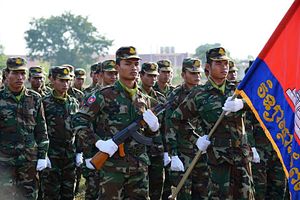Over the weekend, Cambodia kicked off another iteration of one of the military exercises it has occasionally held over the past decade. The development spotlighted the state of the Southeast Asian state’s military amid wider domestic and regional developments.
As I have noted before in these pages, while the focus is often much more on Cambodia’s exercises with outside countries such as China, the country also periodically conducts drills of its own. One of these developments is the military exercise, codenamed Golden Hanuman. Per the government’s count, Cambodia has held three iterations of the exercise – in 2010, 2013, and 2018. Last year’s iteration involved more than 1,000 soldiers and featured several kinds of equipment, including artillery guns, helicopters, tanks, and rocket launcher mounted vehicles.
Over the weekend, latest iteration was held The five-day live-fire exercise, named Golden Hanuman Exercise 2019, began on Saturday at a training ground in Chum Kiri district’s Trapaing Veng commune in southwestern Kampot province.
Ahead of the exercise, per Khmer Times, defense ministry spokesman General Chhum Sucheat indicated that that the exercise would include 1,595 soldiers from various divisions, headquarters, and units –including the RCAF Infantry, Bodyguard Unit, Air Defense Command, Brigade 70, Special Forces Paratrooper Brigade 911, Engineering Command, and Transport Division 90 – and that it would feature artilleries, guns, rocket launchers, tanks, armored vehicles, fire trucks, military trucks, and helicopters.
With respect to the drill’s significance, the Cambodian government had indicated that the military exercise was routine, geared at testing the country’s military capabilities and expertise and without any intention of threatening any group or outside country. But it is nonetheless not without consequence. For one, Cambodian officials have indicated some changes in the exercise relative to previous years, including the units involved as well as some of the focus areas. For another, this is also the Royal Cambodian Army’s first drill under the command of Hun Manet, a son of Prime Minister Hun Sen who serves as commander of the army and deputy commander of the Royal Cambodian Armed Forces (RCAF) and also presided over the opening ceremony.
A true assessment of the exercise will likely only be possible once the dust settles following its conclusion. Some reports of the ongoing exercise indicate that the personnel numbers may actually be lower than initially advertised, and details still remain thin on the exact content of the exercise itself. Nonetheless, such developments warrant close attention to get a sense of where Cambodia’s military is today and where it is headed in the future.

































